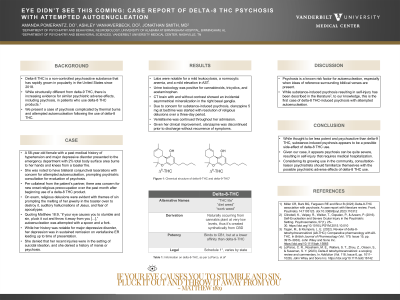Substance Use and Related Disorders
(167) Eye Didn’t See This Coming: Case Report of Delta-8 THC Psychosis with Attempted Autoenucleation


Amanda Pomerantz, DO
Assistant Professor of Psychiatry
University of Alabama at Birmingham Hospital
Birmingham, Alabama
Ashley VanHaverbeck, DO
Consultation-Liaison Fellow
Vanderbilt University Medical Center
Nashville, Tennessee.jpg)
Jonathan Smith, MD
Medical Director, Fellowship Director
Vanderbilt University Medical Center
Nashville, Tennessee
Presenting Author(s)
Co-Author(s)
Background: Delta-8 THC is a non-controlled psychoactive substance that has rapidly grown in popularity in the United States since 2018. While structurally different from delta-9 THC, there is increasing evidence for similar psychiatric adverse effects, including psychosis, in patients who use delta-8 THC products.1 We present a case of psychosis complicated by thermal burns and attempted autoenucleation following the use of delta-8 THC.
Case: A 58-year-old female with a past medical history of hypertension and major depressive disorder presented to the emergency department with 2% total body surface area burns to her hands and knees from a toaster fire. She was noted to have bilateral conjunctival lacerations with concern for attempted autoenucleation, prompting psychiatric consultation for evaluation of psychosis.
Per collateral from the patient’s partner, there was concern for new onset religious preoccupation over the past month after beginning use of a delta-8 THC product. On exam, religious delusions were evident with themes of sin prompting the melting of her jewelry in the toaster oven to destroy it, auditory hallucinations of Jesus, and fear of apocalypse. Quoting Matthew 18:9, “if your eye causes you to stumble and sin, pluck it out and throw it away from you [...],” autoenucleation was attempted with a spoon and a fork. While her history was notable for major depressive disorder, her depression was in sustained remission on venlafaxine ER leading up to time of presentation. She denied that her recent injuries were in the setting of suicidal ideation, and she denied a history of mania or psychosis.
Results: Labs were notable for a mild leukocytosis, a normocytic anemia, and a mild elevation in AST. Urine toxicology was positive for cannabinoids, tricyclics, and acetaminophen. CT brain with and without contrast showed an incidental asymmetrical mineralization in the right basal ganglia. Due to concern for substance-induced psychosis, olanzapine 5 mg at bedtime was started with resolution of religious delusions over a three-day period. Venlafaxine was continued throughout her admission. Given her clinical improvement, olanzapine was discontinued prior to discharge without recurrence of symptoms.
Discussion: Psychosis is a known risk factor for autoenucleation, especially when ideas of reference surrounding biblical verses are present. While substance-induced psychosis resulting in self-injury has been described in the literature2, to our knowledge, this is the first case of delta-8 THC-induced psychosis with attempted autoenucleation.
Conclusion: While thought to be less potent and psychoactive than delta-9 THC, substance-induced psychosis appears to be a possible side-effect of delta-8 THC use. Given our case, it appears psychosis can be quite severe, resulting in self-injury that requires medical hospitalization. Considering its growing use in the community, consultation-liaison psychiatrists should familiarize themselves with the possible psychiatric adverse effects of delta-8 THC use.
References:
1) Miller CR, Burk BG, Fargason RE and Birur B (2023) Delta-8-THC association with psychosis: A case report with literature review. Front. Psychiatry 14:1103123. doi:10.3389/fpsyt.2023.110312
2) Clinebell, K., Valpey, R., Walker, T., Gopalan, P., & Azzam, P. (2016). Self-Enucleation and Severe Ocular Injury in the Psychiatric Setting. Psychosomatics, 57(1), 25–30. https://doi.org/10.1016/J.PSYM.2015.10.010
Presentation Eligibility: Not previously published or presented.
Diversity, Equity, and Inclusion: It is well documented in the literature that members of marginalized groups who face discrimination are at risk of substance-use, including marijuana (Jacobs et al, Addictive Behaviors, 2024), and psychological distress (Jones et al, J Subst Use Addict Treat, 2023). In addition, these patients are more likely to be misdiagnosed with psychotic disorders in the setting of substance use (Jegarl et al, Harvard Rev of Psychiatry 2023). Thus, our case highlights how delta-8 use can also present with psychosis, which may be misdiagnosed as a primary psychotic disorder in this population.

